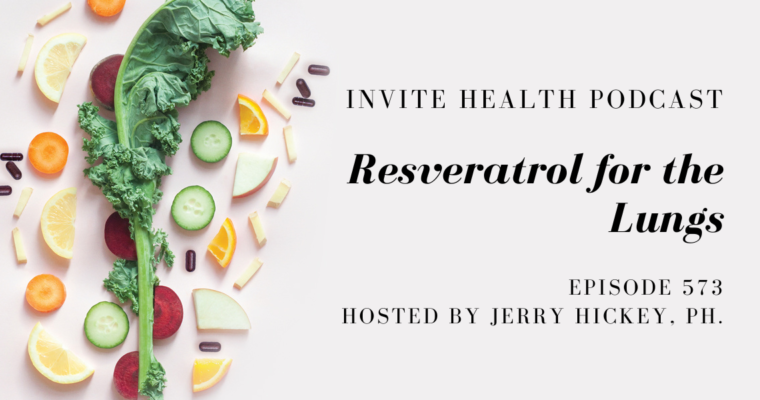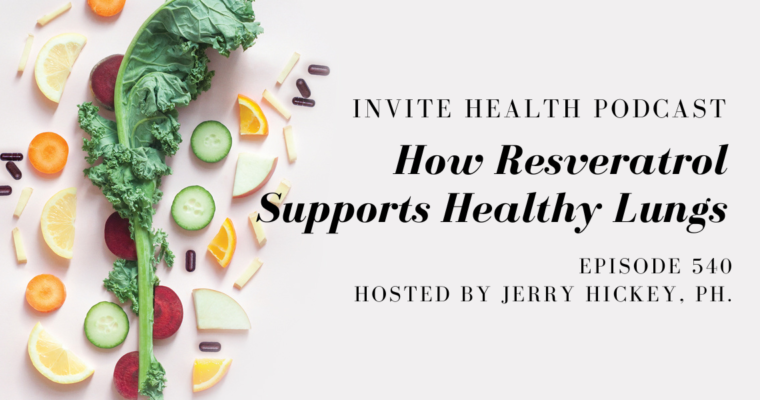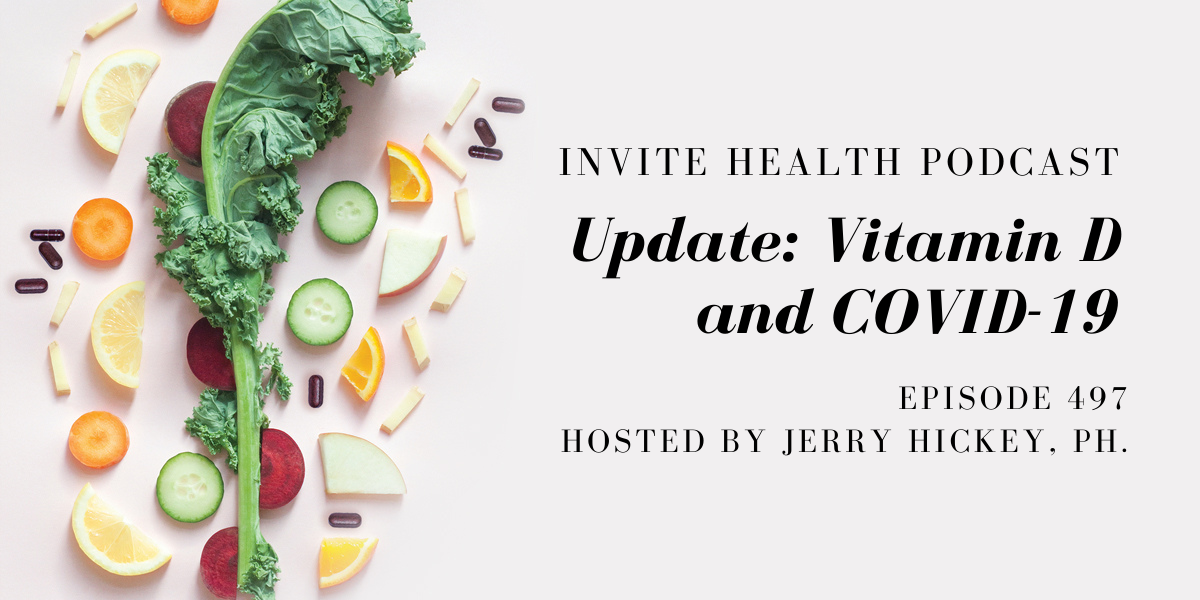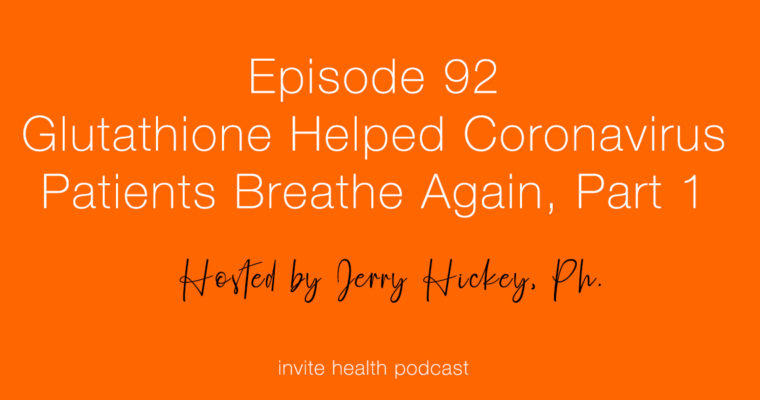COVID-19
Subscribe Today!
Please see below for a complete transcript of this episode.
An Update on Vitamin D and COVID-19 – InViteⓇ Health Podcast, Episode 497
Hosted by Jerry Hickey, Ph.
*Intro music*
InVite Health Podcast Intro: Welcome to the InViteⓇ Health Podcast, where our degreed healthcare professionals are excited to offer you the most important health and wellness information you need to make informed choices about your health. You can learn more about the products discussed in each of these episodes and all that InViteⓇ Health has to offer at www.invitehealth.com/podcast. First time customers can use promo code PODCAST at checkout for an additional 15% off your first purchase. Let’s get started!
*Intro music*
Jerry Hickey, Ph.:
[00:00:40] There is an indisputable relationship between Vitamin D and our immune system. Lacking Vitamin D, such as on a blood test, increases the risk of severe infection, but also increases your risk of having an autoimmune disease where your own immune system is attacking your body, which is a very dangerous situation. And now Vitamin D strengthens a number of immune cells. It’s involved with controlling these cells also. For instance, converting monocytes to macrophages. Very important. These are part of the uneducated part of the immune system that will attack any foreign invader. Monocytes travel to a site and develop into these very big cells. They’re called phagocytic cells called macrophages. Phagocytic means they literally consume and digest bacteria and viruses. But you get these type of cells, for instance, in your liver to clean out your blood because your blood goes, gets filtered through your liver. So Vitamin D is needed for macrophage functions. Neutrophils, they’re dominant white blood cells, they’re not educated. They attack whatever they’re pointed at. Dendritic cells, they kind of connect the entire immune system. T lymphocytes. That’s really important. T lymphocytes are involved with the formation of antibodies. T cells have a memory for particular infections. For instance, if you had COVID-19 three years ago, if somebody sneezed on you or coughed on you with COVID-19 today, you’d have some memory T cells, which would very quickly alert the immune system and have it create new antibodies. Antibodies fit COVID-19 or any infection like a glove fitting perfectly on a hand. T cells go in and shred infections and cancer cells, but T cells also control the immune system. So Vitamin D is involved with all of these cells and B cells. B cells are where a lot of your antibodies are created on B cells.† [00:02:50]
MILK THISTLE IS A TRUE POWER PLANT FOR LIVER HEALTH – INVITE HEALTH PODCAST, EPISODE 299. Listen Now>>
[00:02:52] Now, Vitamin D also raises anti-inflammatory cytokines and reduces the level of inflammatory cytokines. That really came to light with COVID-19. The SARS-CoV-2 virus causes COVID-19. That’s the name of the infection, not the name of the virus. And up front, back in 2020, many people were developing acute respiratory distress syndrome. The virus would invade their lungs and trigger inflammation. There would be backlash from our immune system, and our immune system would fill the lungs with inflammatory cytokines like interleukin six and interleukin four, and this was destroying people’s lungs. This was a major cause of death up front, early on in people with COVID-19. So Vitamin D raises anti-inflammatory cytokines to protect tissues like the brain and the lungs and the heart and the kidneys, etc., such as interleukin 10, and lowers the level of inflammatory, dangerous cytokines so they don’t destroy us. Because our immune system is such a powerful army, it could literally destroy us very quickly. So you need this control.† [00:04:05]
[00:04:06] Vitamin D… This is very important. It can actually be activated by our own immune cells. There’s receptor sites for Vitamin D on almost all of our immune cells. That just shows how important Vitamin D is for the immune system that all of the immune cells practically require Vitamin D activity. But Vitamin D can also be activated by immune cells, which is very interesting. At one time, we thought only the kidneys could activate Vitamin D. Now we know there’s other tissues in the human body that can activate Vitamin D, so this really hits the ball out of the ballpark in the last inning of the World Series, a super homerun. In fact, the grand slam, showing how important Vitamin D is for the immune system.† [00:04:54]
[00:04:55] Also, it’s involved with preventing acute respiratory distress syndrome. Acute respiratory distress syndrome is when the lung gets so inflamed that it’s filling with fluid and you can’t breathe. These are the people that early on were put on oxygen and they were put into intensive care units, they were put on oxygen and ventilators and the ventilators were blowing out their lungs because the SARS-CoV-2 inflamed and damaged the lungs so much that when they put the pressure of the ventilator on the lungs, it just finished off destroying the lungs.† [00:05:25]

[00:05:27] So this is… There’s a lot of new data on Vitamin D and COVID-19. So welcome to my episode, An Update on Vitamin D and COVID-19. Hi, my name is Jerry Hickey. I’m a nutritional pharmacist. I’m also the Senior Scientific Officer over here at InViteⓇ Health. You can find all of our episodes for free wherever you listen to podcast episodes, or you could just visit invitehealth.com/podcast. You can also follow us on Twitter, Instagram and Facebook @invitehealth. And all of the information on today’s episode is linked at the episode description.† [00:06:00]
[00:06:01] So I want to get into these studies. They’re very interesting. This was recently published information from IU International University of Applied Sciences. It’s published in the journal Nutrients. They’re in Germany. The IU International University of Applied Sciences is in Germany, and they used computers, artificial intelligence to find data on COVID-19 and Vitamin D related to mortality. And here’s what they found… That there was a strong correlation between the severity of a COVID-19 infection and the level of Vitamin D in your blood, the level of Vitamin D in your blood. This was based on one huge population study and seven clinical studies. Increased levels of Vitamin D3 seem to strongly, powerfully reduce the risk of mortality from COVID-19. And when they did the algorithm, that’s a mathematical model, hypothetically, if you got your blood level of Vitamin D above 50, there should be no mortality. So the higher the level of Vitamin D in your blood up to 50, over 50 there was no additional benefit, the lower your risk of severe infection, such as winding up in the intensive care unit of a hospital on oxygen, etc. and the lower your risk of dying. So they said that they’re recommending, these researchers, getting your blood level of Vitamin D above 50 to prevent and also to treat outbreaks of SARS-CoV-2, you know, COVID-19, but also to prevent the emergence of new variants.† [00:08:05]
[00:08:08] Now this is the Epidemiology Center, Durham VA Health Care Center. So they’re quantifying, they’re collating all this research and intelligence. They were working with the University of Iowa College of Pharmacy, Harvard Medical School, Duke University, Duke Cancer Institute and Signify Health in Dallas. They published their findings in the International Journal of Environmental Research and Public Health. Cool journal. They’re looking at over 26,000 American veterans, 26,508 American veterans who were diagnosed positive for SARS-CoV-2, so COVID-19. Giving them high doses of Vitamin D cut their risk of dying from COVID-19. The higher the dosage, to a point, the lower their risk of dying in the hospital.† [00:09:03]
[00:09:06] Now they’re giving people with COVID-19 that’s infecting their lungs, etc., corticosteroids such as hydrocortisone, which could be called hydro cortef or prednisone or medrol dose pack. And they found that compared to patients on corticosteroids, giving patients Vitamin D, high doses, cut their risk of dying by 70%. That’s compared to corticosteroids. That’s not saying corticosteroids weren’t saving people. It’s just Vitamin D was more effective. And they found that in hospitalized patients, adding Vitamin D to a corticosteroid such as prednisone or medrol or hydrocortisone further cut the risk of dying by 49%. That’s actually quite amazing. Get on your Vitamin D. My blood level of Vitamin D currently is about 49, so that’s perfect. I mean, 49, 50, not really any difference.† [00:10:08]
STEROID DRUGS DEPLETE THESE NUTRIENTS, PART 1 – INVITE HEALTH PODCAST, EPISODE 471. Listen Now>>
[00:10:09] So this is the Journal of General Internal Medicine. It’s the San Francisco Veterans Affairs Health Care System, the Department of Medicine and Psychiatry, University of California, San Francisco, the Colorado School of Public Health in Aurora, Colorado, and various VA health care centers. It’s published right now, January 2020. So it’s a very, very recent. All of this data is very, very current, very, very recent data. These are patients and the Veterans Administration health care system. They’re in the facilities. They have severe acute respiratory distress syndrome COVID-19. These people are in trouble. It’s hurting their lungs. They then tested their blood for their Vitamin D level, and they followed them for up to two months because not all of them made it to the two month point. Giving the patients Vitamin D… There was a dose response, a strong correlation. So what does that mean? That means giving a little was helpful, giving more was even more helpful and giving a lot was even better. The higher the dose of Vitamin D, the lower the risk of being hospitalized with COVID-19 and the lower the risk of dying from COVID-19. In fact, it cut the risk of dying from COVID-19 basically by 50%.† [00:11:32]
[00:11:37] So Vitamin D is safe, it’s not expensive. I don’t know why the government and all these healthcare agencies are not telling the general public to take some Vitamin D right now. They’re probably worried that people’ll overdo it because people have a tendency to do that. I would, I would get a hold of about 3000 units of Vitamin D3. Now, the research shows that Vitamin D3 is superior to Vitamin D2 for humans. It lasts in our body longer. It works better. It’s more effective. I would get about 3000 units of Vitamin D3, and for the first three days or so, I’d take about 9000 units. I’d take about three tablets or capsules, whatever it might be in, a day with food for about three days, and then I’d cut it down to 3000 units every day with food, because the research shows that taking Vitamin D every day is much more effective than getting one huge dosage once a week or once a month. So take the Vitamin D3 3000 units daily. Get your blood tested. A blood level between like 45 and 75 is beautiful. You don’t need higher than 75.† [00:12:56]
[00:12:59] So I want to thank you for listening to the InViteⓇ Health Podcast today. You can find all of our episodes for free wherever you listen to podcasts or just go to invitehealth.com/podcast. Please leave us a review and please subscribe. I guess if you liked us, you’ll subscribe. In any event, you can also follow us on Twitter, Instagram and other social media platforms @invitehealth. Hope to see you next time in another episode of InViteⓇ Health Podcast. Thank you so much for listening! Jerry Hickey signing off.† [00:12:59]
*Exit music*








